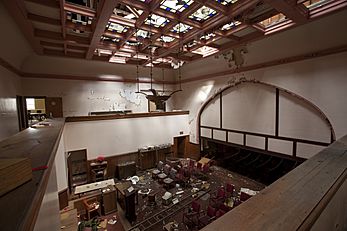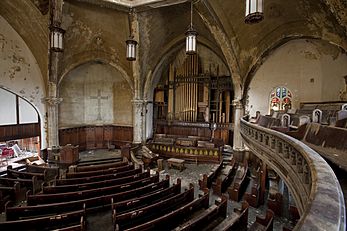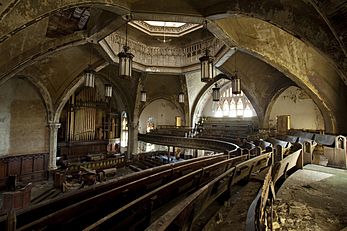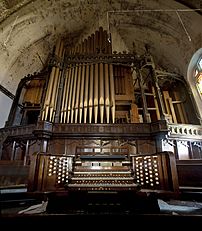Woodward Avenue Presbyterian Church facts for kids
Quick facts for kids |
|
|
Woodward Avenue Presbyterian Church
|
|
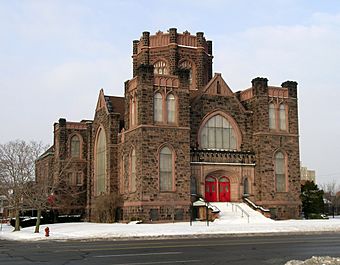
Church façade from Woodward
|
|
| Location | 8501 Woodward Avenue Detroit, Michigan |
|---|---|
| Built | 1911 |
| Architect | Sidney Badgley |
| Architectural style | Late Gothic Revival |
| MPS | Religious Structures of Woodward Ave. TR |
| NRHP reference No. | 82002916 |
| Added to NRHP | August 3, 1982 |
The Woodward Avenue Presbyterian Church is a historic church building. It is located at 8501 Woodward Avenue in Detroit, Michigan. The church was built in 1911. It was designed in the Gothic Revival style. The architect was Sidney Badgley. This beautiful building was added to the National Register of Historic Places in 1982. For some time, it was known as the Abyssinia Church of God in Christ.
Contents
History
Building the Church
Around 1908, Presbyterian church members in Detroit needed a new church. They wanted one to serve people living in the "north" Woodward area. Meetings were held to plan the new church. The church group was officially formed on March 17, 1908. It started with 163 members.
Rev. Sherman L. Divine became the first minister. He had a big plan for a new church building. He imagined a large church that would cost about $100,000. The church worked hard to get new members and raise money. Tracy and Katherine McGregor gave land along Woodward Avenue. The first stone for the church was placed on January 1, 1910.
Construction began based on a design by Sidney Rose Badgley. The church was finished and opened on June 23, 1911.
Changes Over Time
By 1921, the church had grown a lot. It had more than 2,200 members. However, in the 1950s, many people started moving out of Detroit. They moved to the northern suburbs. The Woodward Avenue Presbyterian Church began to face challenges. By 1961, it had fewer than 1,000 members. In 1971, only 404 members remained.
In 1981, the Woodward Avenue Presbyterian Church joined with Covenant Church. Even together, they had fewer than 500 members. By 1991, there were only 210 members left. In 1993, the church group decided to leave the Presbyterian church. It became the Abyssinia Interdenominational Church. Pastor Gary Douglas led this new church. The church closed in 2005 after the pastor passed away. The Woodward Avenue Presbyterian building was then left empty. It has since fallen into disrepair.
What Happened Next?
The building was sold several times. However, none of the new owners had enough money to fix such a large property. Later, an information technology company bought the building. This company also bought a building next to it. In 2018, a company executive spoke on TV. He shared plans to restore the church for the community.
By January 2019, the company had replaced the roof. They were also cleaning the inside and making the building stronger. However, in July 2019, the technology company faced problems. It was stopped from doing business with the city until 2026. This happened because the company did not follow city rules for business contracts. As of 2020, there were no updates on further repairs.
Architecture
The Woodward Avenue Presbyterian Church is built in the English Gothic style. It has rough stone walls with contrasting light-colored limestone trim. The church is 184 feet long and 104 feet wide. The front of the church, facing Woodward Avenue, has a large carved-stone entrance. Above this entrance is a beautiful stained glass window with detailed patterns. Two square towers stand on each side of the main entrance.
Along the side of the church, there are parts that stick out called gabled transepts. These sections have tall, patterned windows. A two-story building for education is attached to the back of the main church. It was built at the same time. A special dome, called a lantern dome, rises above the roof. This dome helps light up the main worship area inside.
Gallery
See also
 In Spanish: Iglesia Presbiteriana de la Avenida Woodward para niños
In Spanish: Iglesia Presbiteriana de la Avenida Woodward para niños
 | Percy Lavon Julian |
 | Katherine Johnson |
 | George Washington Carver |
 | Annie Easley |


